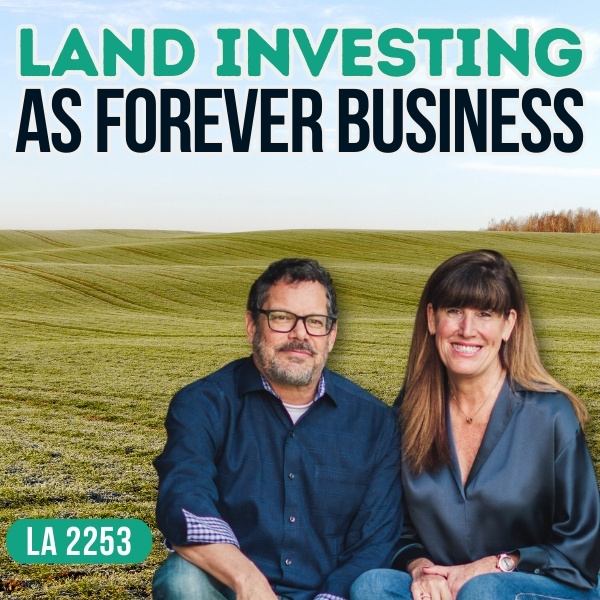This is Episode 2034. In this episode, we are talking about adding value to a land deal by minor splitting or subdividing the land. There’s all kinds of misinformation out there. Jill and I will tell you exactly what’s possible and likely and how we do it and make it work for us.
Also, when should you do it. The biggest thing I hear people doing is when you are new to land especially, you think you have to do something to make it more valuable. That’s not what we are saying. I don’t want you to go out and overspend on something because you are going to split it and it’s going to pay off in the end. I still want you to buy it. This is an option.
A Discord Question About Text Message Service
We want you to make money, and we want you to do it realistically and go into it with your eyes open with what to expect and all of that. All week, it is what I’m calling the theme of adding value to your land deal. One way you can add value is to minorly split the property, but depending on where you are in the country, it’s tricky. It can be glorious and profitable but it’s time-consuming. We’ll talk all about it. Each day on the show, we answer a question from our Land Academy member Discord forum and take a deep dive into a land-related topic at your request. Let’s take a question, Jill.
James wrote, “Does anyone recommend a text message service that doesn’t give warnings for stop responses or shut the service off after no reply messages aka Google Voice?” For my work phone, we have a phone system because we have numerous employees and we need to transfer calls and different phone numbers feed in. It’s not just my little land business. It’s more like Land Academy. I use my work phone all the time and I forget that it’s on there. Sometimes, text messages go out. Let’s say I’m out of town and I’m booking a hair appointment. They’ll tell me later, “Please reply ‘Stop’ to stop it.” I’m like, “Huh?” They’re like, “You’re booking a hair appointment.” I’m like, “I’m very confused here.”
There are some services that you can get. First of all, you could go get a whole separate phone number and that’ll solve that, number one. It’s getting more advanced and easy, depending on what you are doing. I know there’s probably a trailing response in Discord on this. Ten people said, “Use this phone. This doesn’t do it. Here’s how,” and all that good stuff.
Every marketing idea that’s very effective eventually gets regulated because it gets misused and abused. Texting and spam, which fall under the spam laws, are no exception. Let’s start with the actual rule. The actual rule is some version of this. You can’t solicit or reach out to anybody. Solicit means to reach out to somebody or attempt to contact. It doesn’t mean trying to sell them something.
According to the law, you can’t reach out to somebody if you don’t have a preexisting relationship. Think about that. How do I have a relationship? Do I have to meet them in person in a bar? I don’t know. I have always wondered about that. That’s the rule. If you have a pre-existing business relationship with somebody, it’s perfectly legal and ethical to contact them via text. That doesn’t help us. We have thousands of people we want to send letters to every month and contact them.
Here’s what we do. If you have a target property and you want to sell it, this is how we use it. We effectively text people on a personal level down that block to say, “Hey, John Smith,” not, “Hey, you,” or, “Hey, landowner,” or any of that stuff. It is, “Hey, John Smith. We purchased the property down the street from you and were going to resell it. We’d like to offer it to you if you are interested in buying it for this price before we list it for sale.” That seems to evoke very positive responses like, “No, thank you,” or, “Thanks for letting me know. We are not interested,” or, “We are interested.” That’s a healthy, in my opinion, use of texting.
The way that you don’t want to do it is robo texting where you have a list of 1,000 numbers from a database and you buy into a service or send out thousands of notes saying, “Do you want to sell your land?” If you start to look around the internet, there are class action suits that revolve around that all over the place and they are very expensive and all complaint-driven.
I started my career with faxing. I was literally sending mail-merged faxes all over the country to see if people wanted to sell their nursing homes. There was no regulation based on that and it was very successful. One day, I woke up and that was no longer possible. The regulations kicked in for any solicitation for some reason.
If you talk to anybody who doesn’t live in this country who’s buying and selling land here, they are shocked and amazed that we have access to a database, first of all, of who owns everything, and second of all, that you can send them a letter and it’s legal and ethical. Tread very lightly about texting. I understand the sentiment. As an entrepreneur, you are like, “What?
I’m sure there’s a lot of discussion on here. We have used Vumber. There’s OpenPhone. I can’t remember what the latest and greatest best one is but I’m sure there were responses. I’m sorry I didn’t see this in Discord. I will be sharing the response directly from Discord. I know people have waited there on that. I have never been a fan of Google Voice no matter what at the very end of the day. I don’t know why. It didn’t work for me.
I agree with you. I haven’t used it recently but it used to be clunky and clicky. There would be delays and then it would get rerouted somewhere. It was obvious.
It was obvious what it was.
I don’t know if they changed it.
In Google Voice, I don’t think you own the phone number. It’s very different when you get a Vumber number or OpenPhone or other things. You own that number and port them around. Google Voice might even change, so you have to be careful of that. You want a number you are going to keep.
My final point on this topic is we are entrepreneurs. When you take a step back and say, “I could do this. That’s going to make some money and maybe do some good on the planet,” then you get into it and find out you can’t do it because the regulations have stopped you. This has been happening in my entire entrepreneurial career for decades about land, and it’s not land-specific. It’s for anybody who’s an entrepreneur who’s trying to do something to make some dough. It’s very regulated. Please keep this in mind.
James, I chose your question out of a lot of questions on Discord because I wanted to say and make this point. When something seems amazing in the entrepreneurial world and you’re like, “All you have to do is get a list of everybody’s phone number and all these people that own land and send them a text message to see which ones want to buy it,” it’s probably been so abused by the time you got to it that you are going to have to be careful. You have to have some knowledge of the whole thing and use it within your risk level.
Adding Value To Land Through Minor Splitting
Our topic is adding value to a land deal by minor splitting or subdividing the land. Let’s take a look at some definitions very quickly. I will start with a story. A long time ago, I purchased a 40-acre property in Arizona. It was obvious to me that somebody went and subdivided the 40-acre property into 1-acre properties, just squares. There were forty one-acre properties. They subdivided it. When they were done, they got 40 APNs out of it. The person that I bought it from undid that.
The subdivider did what they did. Somebody bought all those properties and then went to the county and said, “I don’t want all these properties and these APNs. I don’t want to pay all the taxes on 40 properties. I want to do it on one.” They put it all back together and then they got my letter. This is a million years ago. I bought the property from them and undid it. This is back when you could do all this stuff. This is back when you could send a text message without fear of regulation.
This is how and why financially as an entrepreneur subdividing or minor splitting land is so attractive. You buy a 40-acre property, which in my case I bought for $4,000, and you get 40 acres. If you can rewrite the descriptions, send them to the county, and sprinkle some magic dust on them, you get 40 APNs back to resell. Can you imagine? The math on that is staggering.
Let’s say I buy the property for $4,000. I have forty one-acre properties and I sell them each for $1,000. I have invested $4,000 and gotten $40,000 back. This is a tiny little example. If you’re Toll Brothers, Shea Homes, or a massive home builder, this is a reality. This is what subdividing is. You take a big piece of farmland, usually on the outskirts of an urban area, make it into tiny little lots, and resell the lots through whoever’s going to go vertical or build houses on it. It’s crazy profitable. In that case, that’s a real subdivision. There’s a 1 to 2-year process with a team of lawyers. You have to have a lot of mental brain power to get a subdivision done in a place like Phoenix, let’s say. Phoenix happens to be a place in the country that encourages this.
It all starts with the spreadsheet. “I can buy $4,000 and sell for $40,000. Sign me up. Where do I start?” That’s the message the people on the internet are delivering to new people in this business. You can print money splitting land? That’s not the case. Mathematically, it works. I bought the property and I did that. I undid it because it was already done. It was pretty easy back in the day when you could do that. It was very profitable. I had a bunch of deals like that.
You start with the mathematical concept. You get tears in your eyes because it’s so beautiful. You start doing the math like, “I only need to do ten of these deals and then I’m done forever.” Especially in an urban area, that’s not the case. The root of minor splitting land is you take 1 APN, that same 40-acre property, and create, for math’s sake, 4, and then create four ten-acre properties.
In those ten-acre properties, you will make a profit generally because a small property on a price-per-acre basis is more valuable the smaller it gets. I hope that makes sense. In economics, they call it the bottle case theory. You buy a case of beer but each bottle you can sell individually for more than the sum of the price of the case. That’s the economic theory behind this.
It’s very realistic in certain areas. Texas specifically is very open to minor splitting land. The root of it happened with farmers. They would take a large property of the farm that they had. When their daughter or their son would get married, they would take back 40, subdivide it off, and get it its own APN. They would give it to their child and their child’s spouse and they would have a happy life back there working on the farm. That’s the root of this, and you still can do it. It’s possible in many areas.
The further West you go, the more likely it’s possible to do minor splits once you get a survey. The real way to do it is you find out first if it’s possible in the county you are in. I have yet to see an incorporated municipality, meaning a city that’s not just county land that allows this. Have you ever seen a city?
I’m sure it’s possible, but there are probably more hoops, more regulations, and all that too because people do it.
You want to find a place that’s not going to fight you throughout this process. You want to get on the phone with the planning, zoning, and accounting and say, “My first step is to look around on the internet for what’s for sale.” You look and find something and it’s obvious somebody did that. There are 4 or 5 lots right next to each other. They are all an acre or an acre and a quarter. It’s obvious that they went through the process of a minor split. That tells me that it’s possible and likely that if you find a property that fits their criteria and meets the county planning and zoning, you can do it.
It gets confusing for people when they go down this path. They are like, “Are you talking about putting in roads? They told me I have to put in two fire hydrants over here and then I got to make sure we have this and I got to do this. Are you talking about that?” Would you please clarify?
It depends on the municipality. Some municipalities allow you to split it. Texas is one of them.
Without doing infrastructure.
Rural areas in Texas allow you not to divide the land. They issue new APNs. What you are doing is taking 1 APN and making 4 or 5.
You want to be smart about it too. Make sure if you have four and there’s a mile in the road, divide them up so they all have access. Some people don’t think about that. I’m sure you’ve looked on maps and said, “Whose nutty idea was this where they have done that?” where theoretically, there was no legal and physical access and it was allowed back then.
The point is that it’s possible. Minor splitting property is very possible in certain areas if the lot and the actual piece of land fit the criteria for the municipality. They are going to accept it. They will accept it at the end. It’s very likely that they will without asking you to put infrastructure in. This is something that eventually will go away.
My point at the beginning was I want you to buy it right. Your buy this for $4,000, split it all up, and sell it for $40,000 story is great. The nice thing is when he bought it for $4,000, he knew he could sell it for $10,000 in its current condition. You have options. It is like, “Do I want to cash out and make $6,000 on this or do I want to put the time in it, wait several months, work with the county on this, and then sell all these off?”
The likelihood of you ever doing this in your career is very small. Jill and I have done 16,000 deals since the early ‘90s. I have minor split property twice with Jill and maybe eight times back in a different era that I have done it. It takes 1 to 2 years to complete this. The property that you are purchasing has to be conducive to what the county wants for them to allow it.
You need a professional surveyor, a local person who knows the people in the county on a first-name basis, who can do the survey, divide it, and run the paperwork through the county because they know everybody. You choose that surveyor because the county likes them and the county believes that the work that they are doing is better for the county, not worse. There are a lot of things you have to line up for this to work.
What Jill is alluding to is don’t count on this. If you are going to buy a piece of property for $4,000 and you can sell it for $10,000 in as-is condition or $40,000 to $100,000, that’s fantastic. If you are out looking for property because you can minor split it like the math I did, which is buy for $4,000 and sell for $40,000, you are going to be disappointed.
You are buying it for $20,000 to sell it for $40,000. That’s my thing. I don’t want you to overspend because you are banking on this. Why do we not do it that much? I will tell you why. It’s because of this exact reason. We buy it going, “Look what’s possible. We can do this. We can do that. We’ll make all this money,” and then we stare at each other going, “Sell it.’”
We’re like, “Let’s make the 40% or 80% markup instead of waiting 2 years to make 200%.”
We’re like, “I don’t want to wait that long. I want to use it on this other thing too.”
We have people in our group that this is all they do. Sometimes, they put mobile homes on them and all kinds of stuff. It’s very profitable. What I would recommend is that you find a business partner that does this and bring them a deal. Say, “I did all the research. For this county, this is what they want. They want this acreage size, this access, and all of it. Here’s a deal. What do you say you and I split it together?”
Closing Words And Next Episode’s Topic
If somebody does this for a living and they are a little bit older and have a lot of experience under their belt like us, they are going to say, “Let’s do this together.” That’s the best way to break into the minor splitting business. Join us next time where we discuss flipping mobile homes to add value to your land business. You are not alone in your real estate ambition. We are information Jill and inspiration to buy undervalued property.















